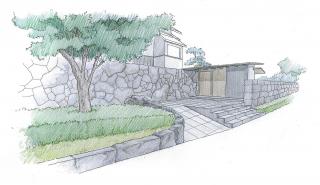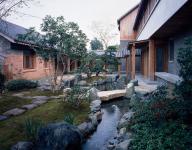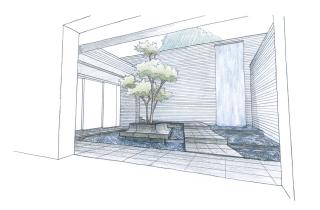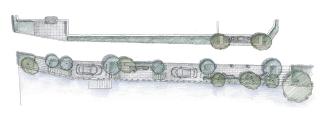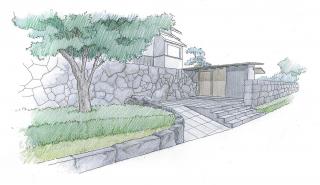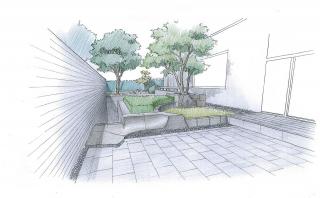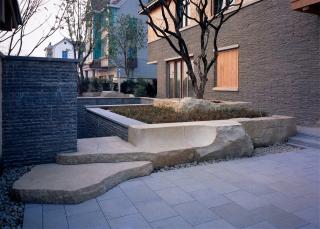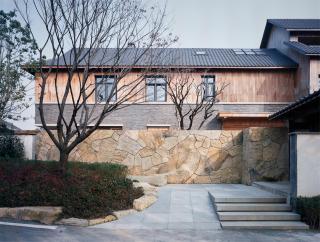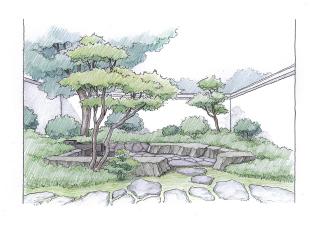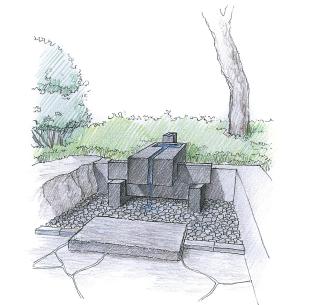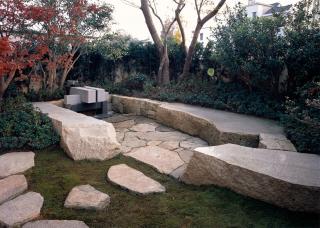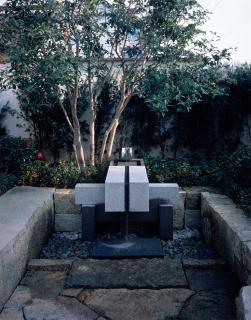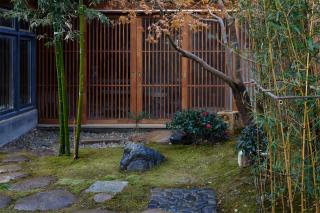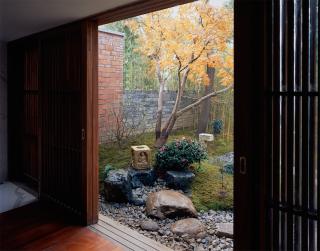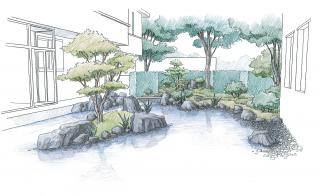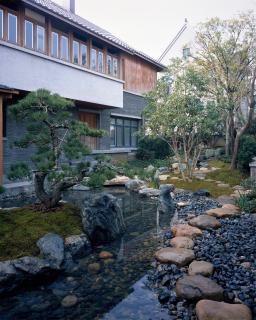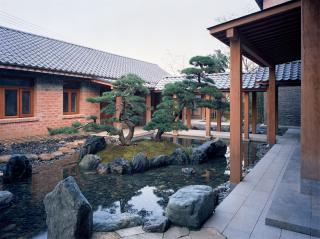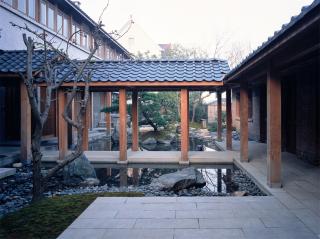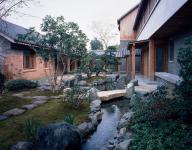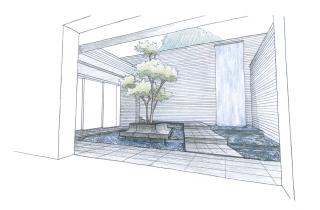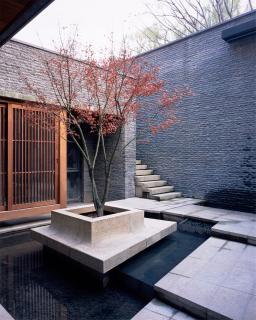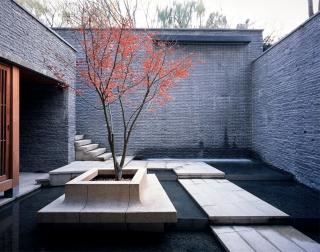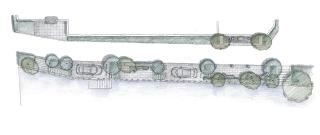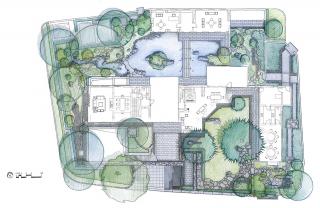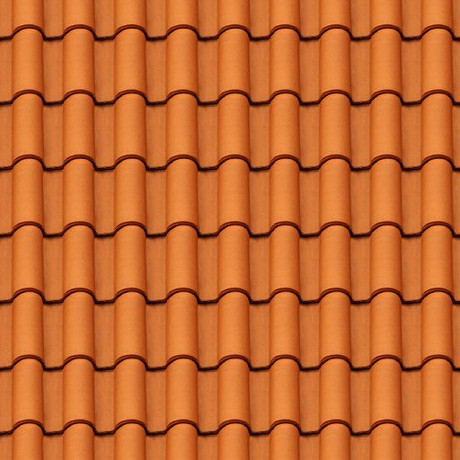項(xiàng)目位于浙江海鹽一處私宅�����,建筑包括主宅����、餐廳、書齋三棟建筑以及一處車庫�����,整個(gè)宅院由院墻圍合�����。庭園設(shè)計(jì)范圍包括一層建筑外空間�����,以及一處地下一層天井����。宅院造園旨在盡量減少人工的事物,等待自然的給予?����,F(xiàn)代人終日被“人工”的環(huán)境所圍繞�����,“心為物役”�����,設(shè)計(jì)師希冀在此營造出一個(gè)讓時(shí)間在自然韻律中慢慢流逝的場(chǎng)所���。
Qinglian Garden is located within a private property in Haiyan county, Zhejiang province. Within the enclosed property wall, the bespoke architecture design is composed of three buildings which are the main house, restaurant�����,and library, along with parking spaces at the rear of the property. The design scope includes outdoor space on the first floor and a courtyard at the lower level. The design philosophy is to construct a nature-resembling landscape while minimizing artificial traces. In the modern society, people are surrounded by man-made environments most of the time. One should take command of the objects around them, instead of being subservient to the environment. Therefore, designers wish to create a unique space where time will follow the rhythm of nature, uninterrupted by human activities.
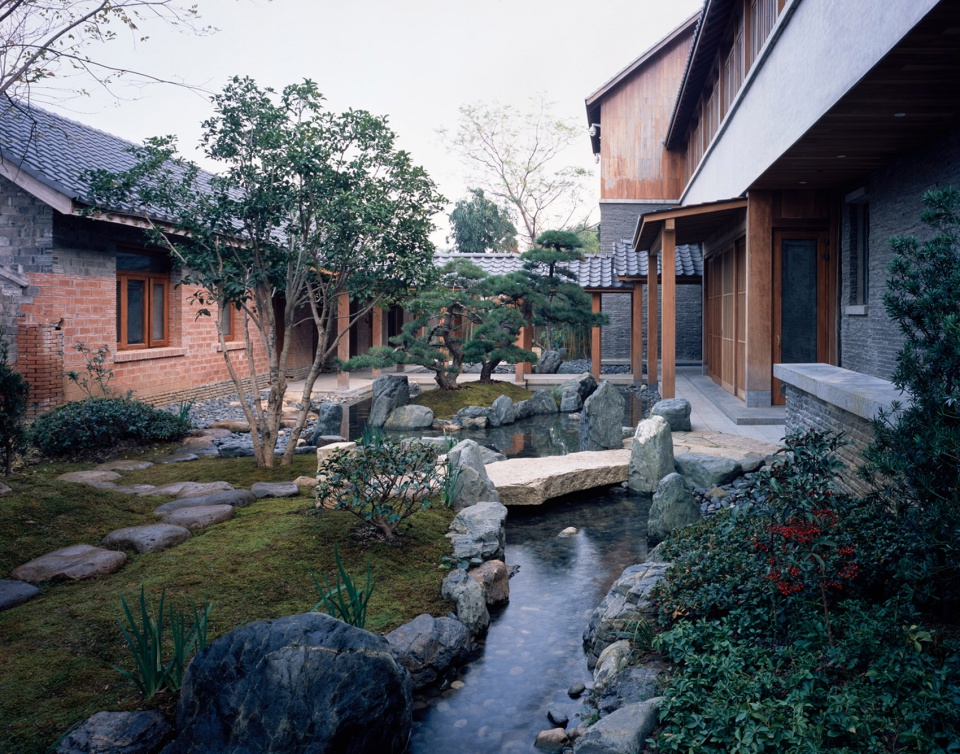

▲總平面圖 Site plan ? 七月合作社
入戶及草坪空間
Entrance and Lawn Area
經(jīng)宅院入口轉(zhuǎn)折進(jìn)入�����,使人從外界環(huán)境中沉淀下來�����。設(shè)計(jì)師使用大量自然材料�,路徑、花池與樹的設(shè)計(jì)不是單獨(dú)存在��,而是互相滲透去邊緣化����,用石頭本身的紋路和表情去咬合、拼接�����,過渡好由平到起的過程���。
As users enter the garden after taking a few turns, the state of mind settles down from the noisy outside world. Designers use large quantities of natural materials and interweaving them with one another; the technique is shown in paving, planters, and vegetation. Designers aim to utilize the texture of stone itself as the conjoining element between different surfaces, softening the transition from the ground to vertical elements.
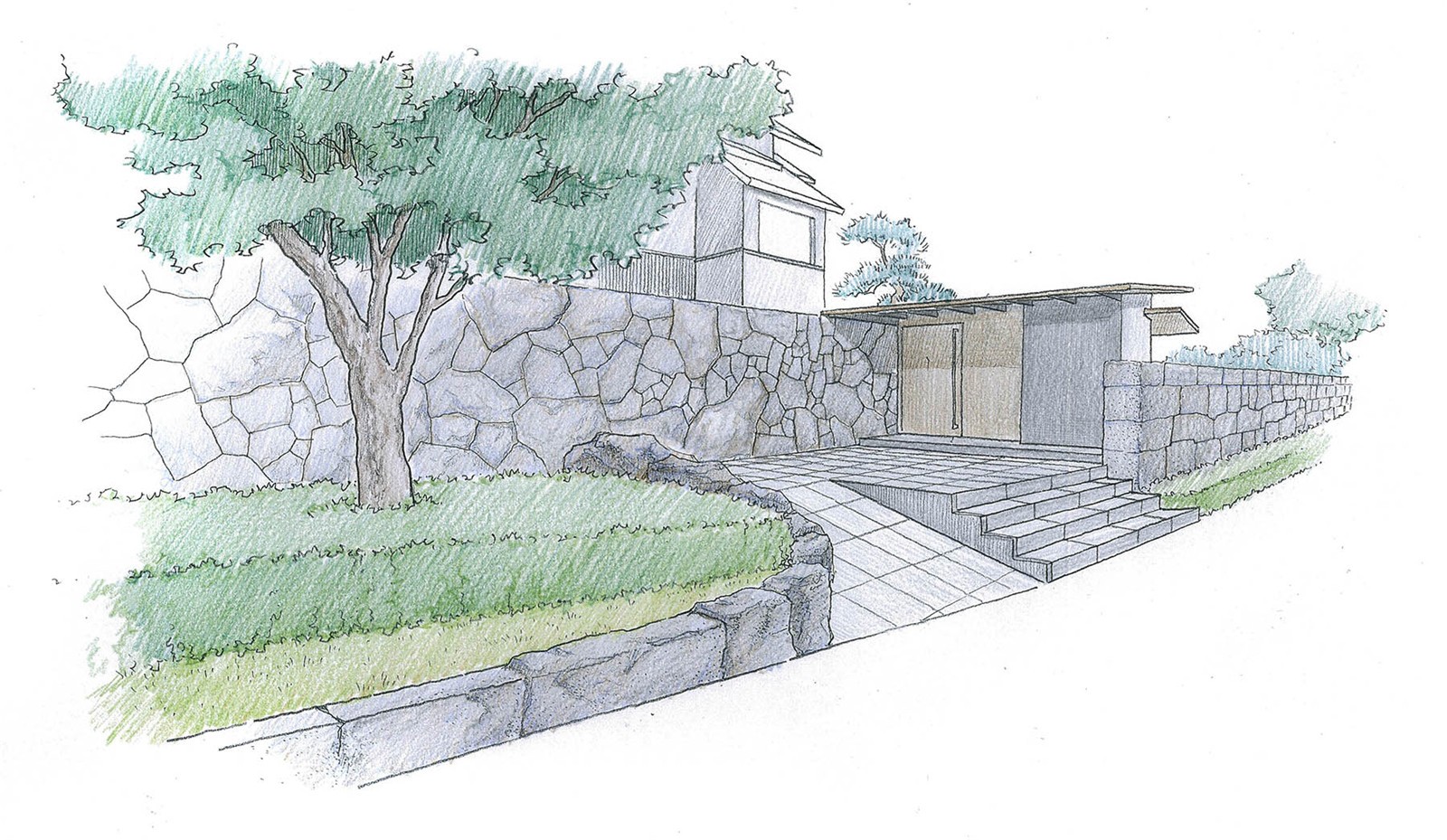
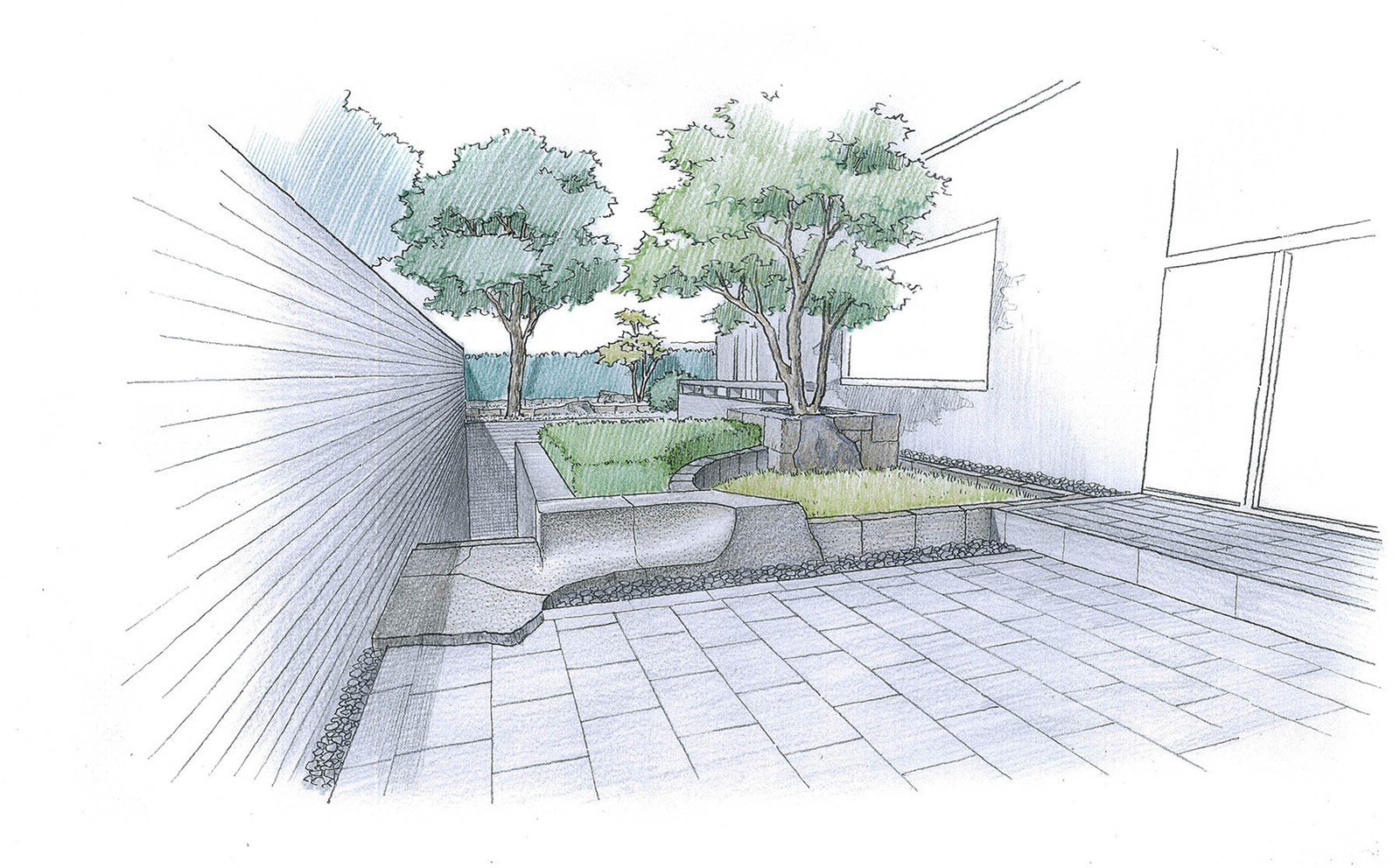
迎接回歸心情的是大片舒朗空間�����,以石木為筆���,以土地為底。視角轉(zhuǎn)換到餐廳望向草坪����,設(shè)計(jì)師將大樹種在前方,目之所及至樹冠���,不見全貌�����,把小樹種在后方����,深化近大遠(yuǎn)小的感受����,使人感受到草坪比實(shí)際看到的更大。
Welcoming the owners returning home is a spacious courtyard, where the ground serves as the canvas, stone and vegetation as the brush. Then users enter the restaurant and the front lawn is viewed through a window. A large tree occupies the foregroud, only the trunk can be seen due to its height. Small trees are planted in the distance to exaggerate the depth of the field which makes the front lawn looks larger than reality.
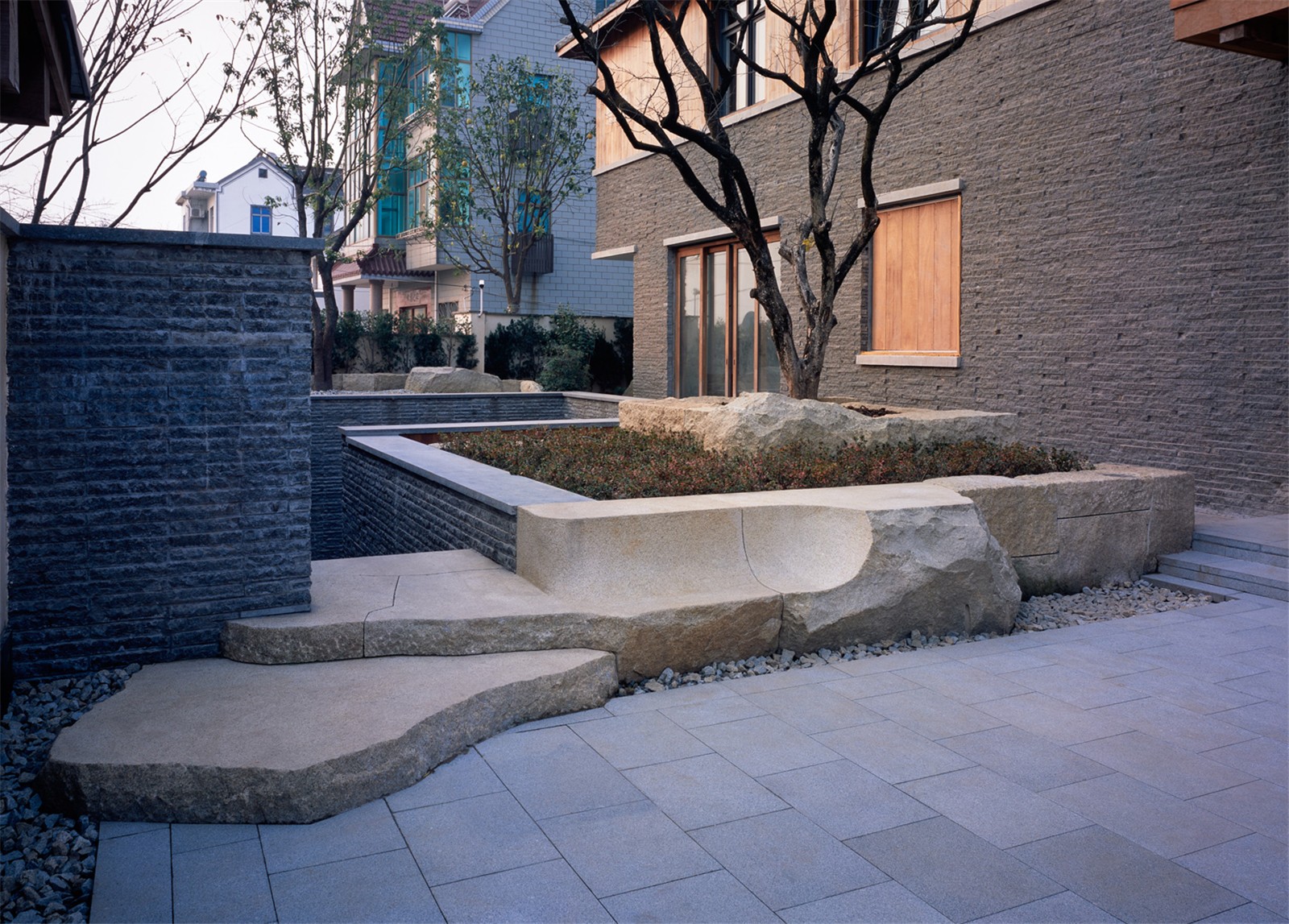

東側(cè)過渡空間
East transitional area
項(xiàng)目前院風(fēng)格為緊湊����、現(xiàn)代、人工��,后院則偏向松弛、傳統(tǒng)�、自然。進(jìn)入東側(cè)的生活化的過渡空間���, 環(huán)境氛圍給人心理上的安定與慰藉�。休息后進(jìn)入一處狹長通道��,在行進(jìn)中讓人對(duì)下一個(gè)到達(dá)的空間愈發(fā)期待����。
Front yard presents a compact, modern artificial theme; however, the back garden mimics a loose/relaxed traditional natural escape. Entering the buffer zone from the east, users are calmed by the atmosphere that provides a certain degree of comfort. After a brief pause entering a narrow path, users begin to anticipate whats around the corner strolling through the narrow space.
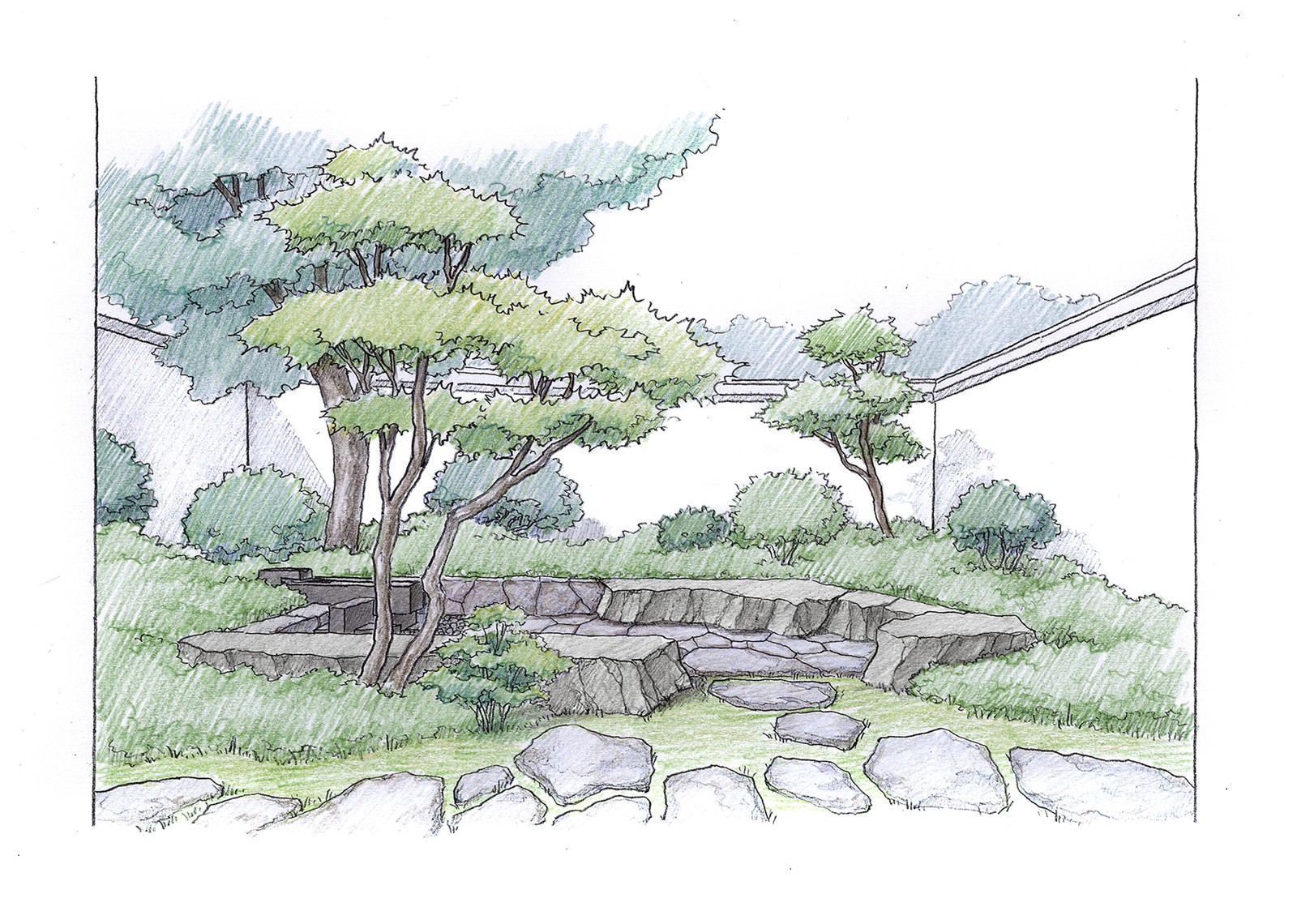
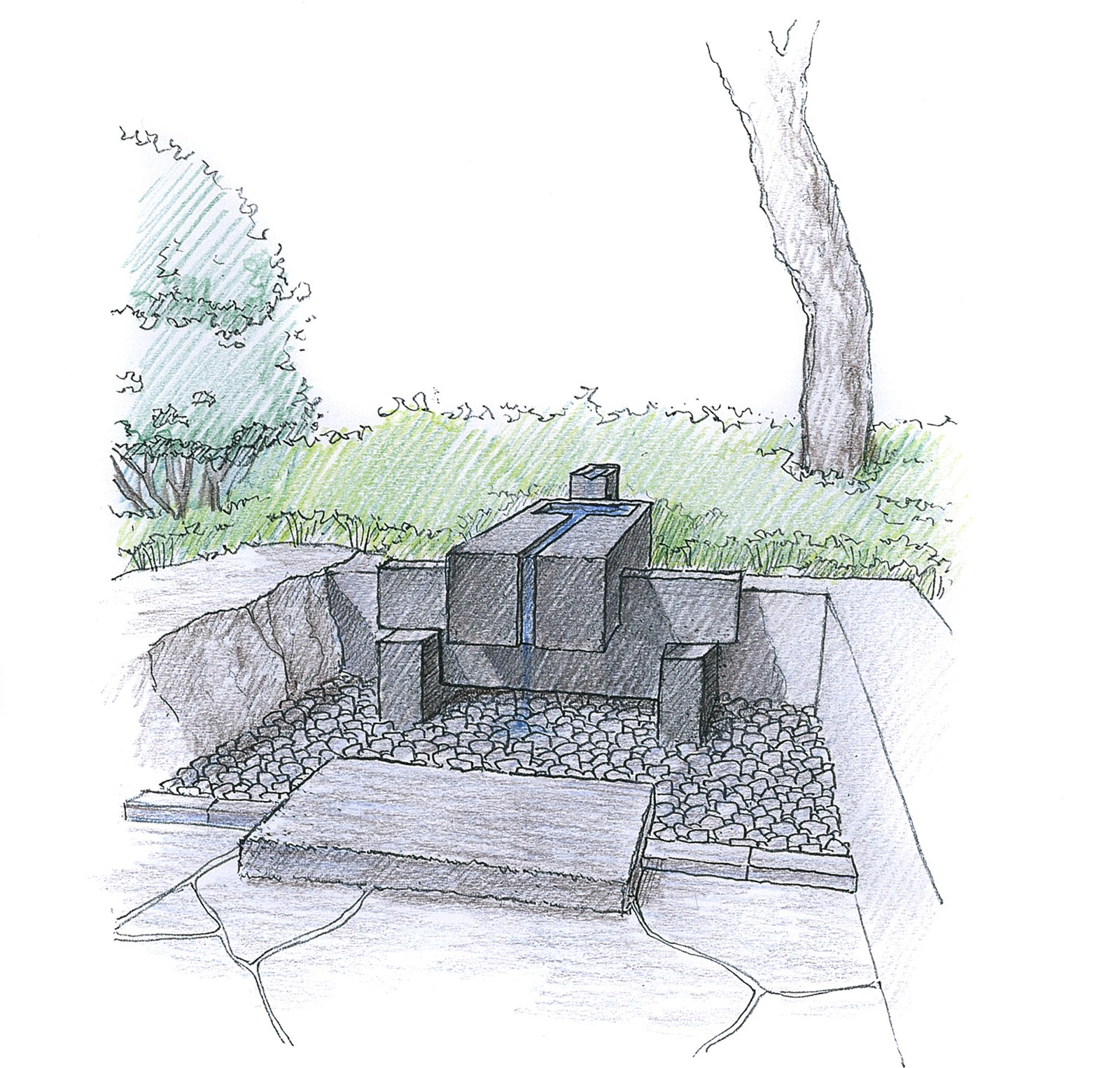
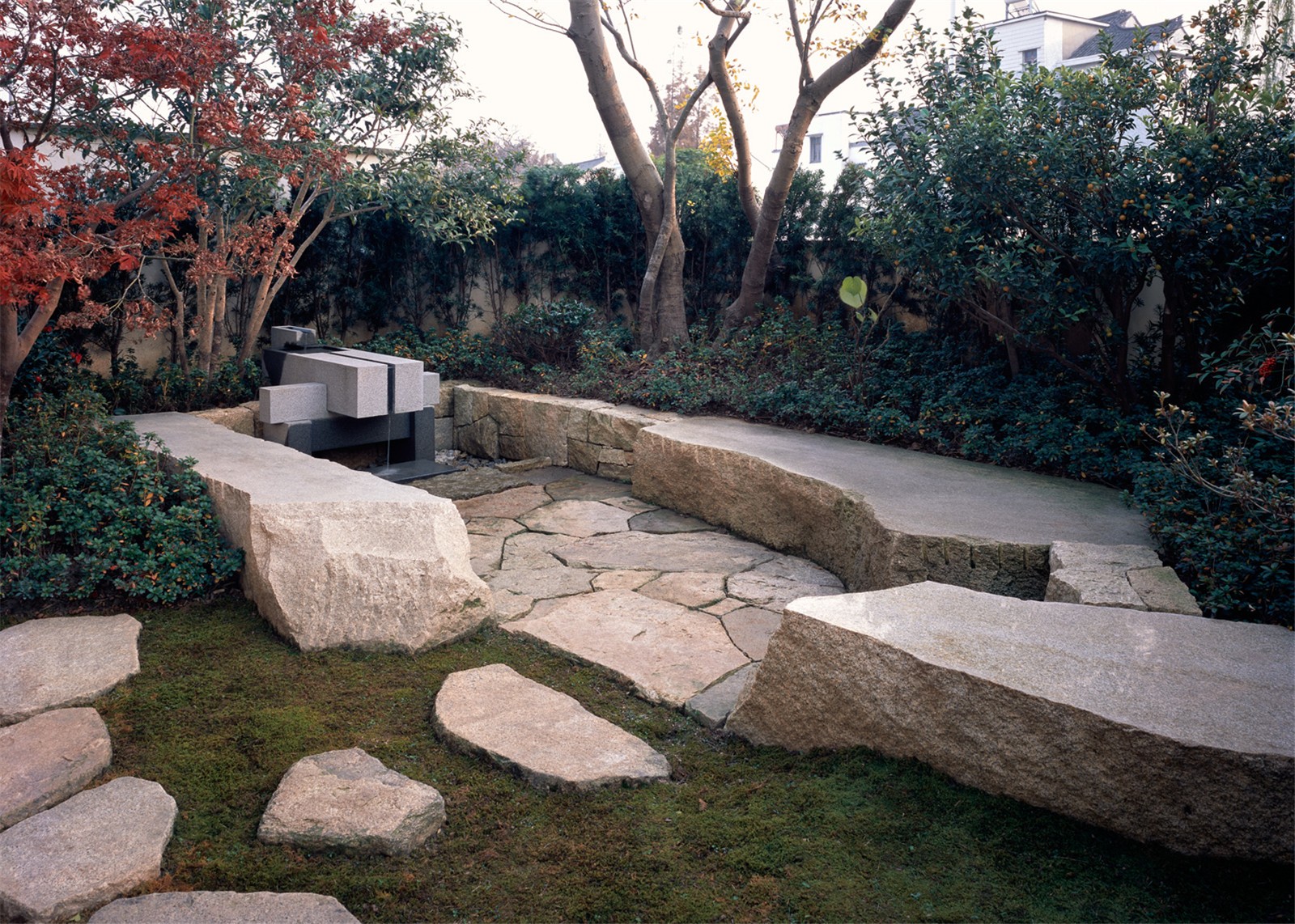
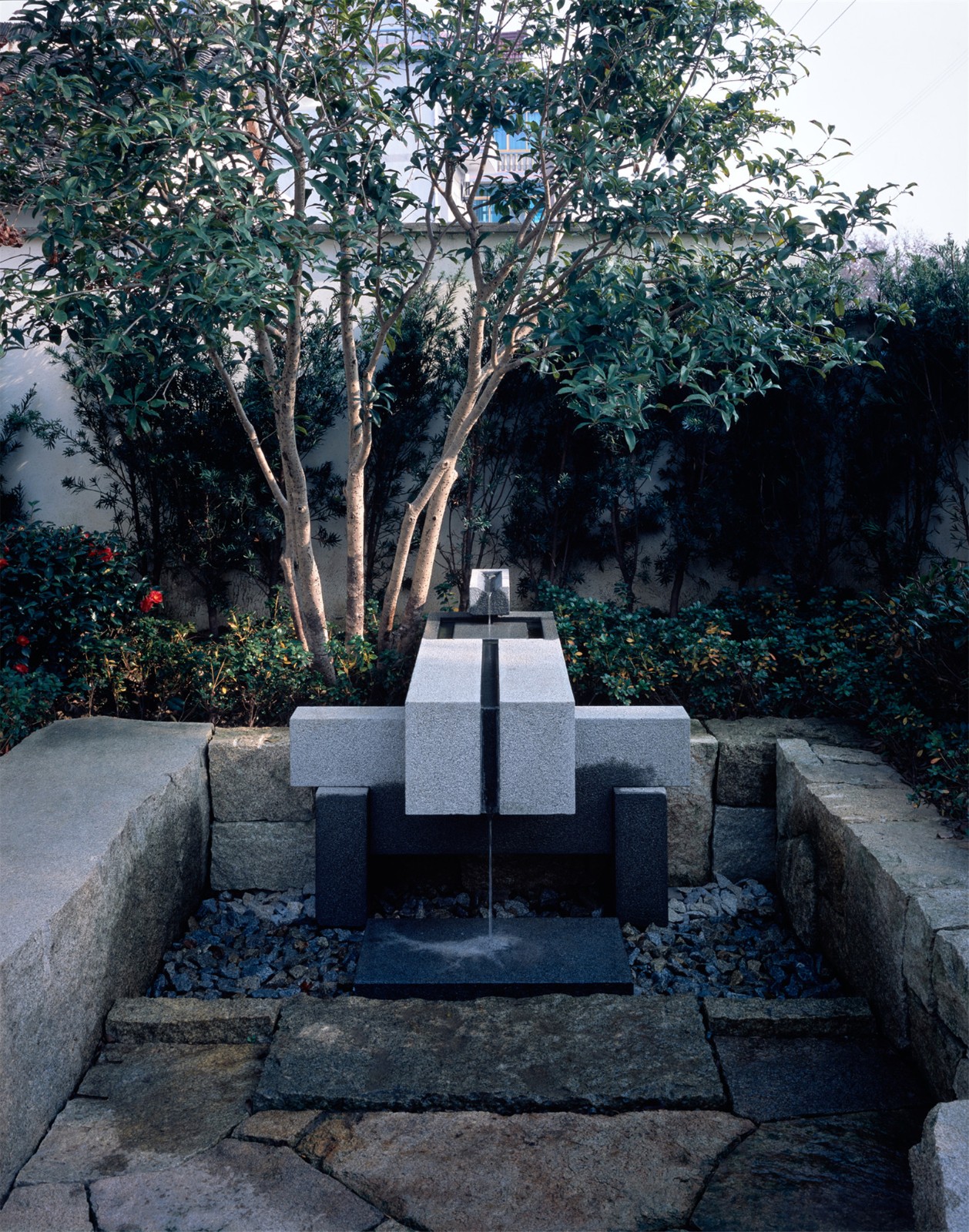
書齋庭園
Library area
循著踏步,進(jìn)入整個(gè)項(xiàng)目中最幽靜��,也是最為松弛的書齋區(qū)域��。即使是經(jīng)由西側(cè)進(jìn)入�����,也需經(jīng)過砂石組成的海面�����。踱過石橋����,走入安寧�,如同一種儀式感��,情景與心情都發(fā)生轉(zhuǎn)化后方可到達(dá)書齋���。
設(shè)計(jì)師采用最為傳統(tǒng)的庭園做法,隱藏的水琴窟(すいきんくつ)裝置營造出一處聲景����,流水音與水滴音在沉靜中發(fā)出輕盈的擊水聲,似是遠(yuǎn)方鐘磬����,令人得以完全放松下來,回歸平靜與放松�����。
Users enters the library area next, which is the most relaxing area in the property. Even when entered from the west side of the garden, users need to pass through a sea of gravel. Walking on the stone bridge soothes the anxiety from the external environment as if taking part in a ceremony. All emotions and sensations will be transformed before entering the library area.
Designers adopt the most traditional technique, using a hidden gong-like instrument to construct an acoustic landscape. Water flows and lightly drips onto the instrument in the quiet atmosphere, resembling bell tone coming from afar, allowing users to completely relax and return to a peaceful state of mind.
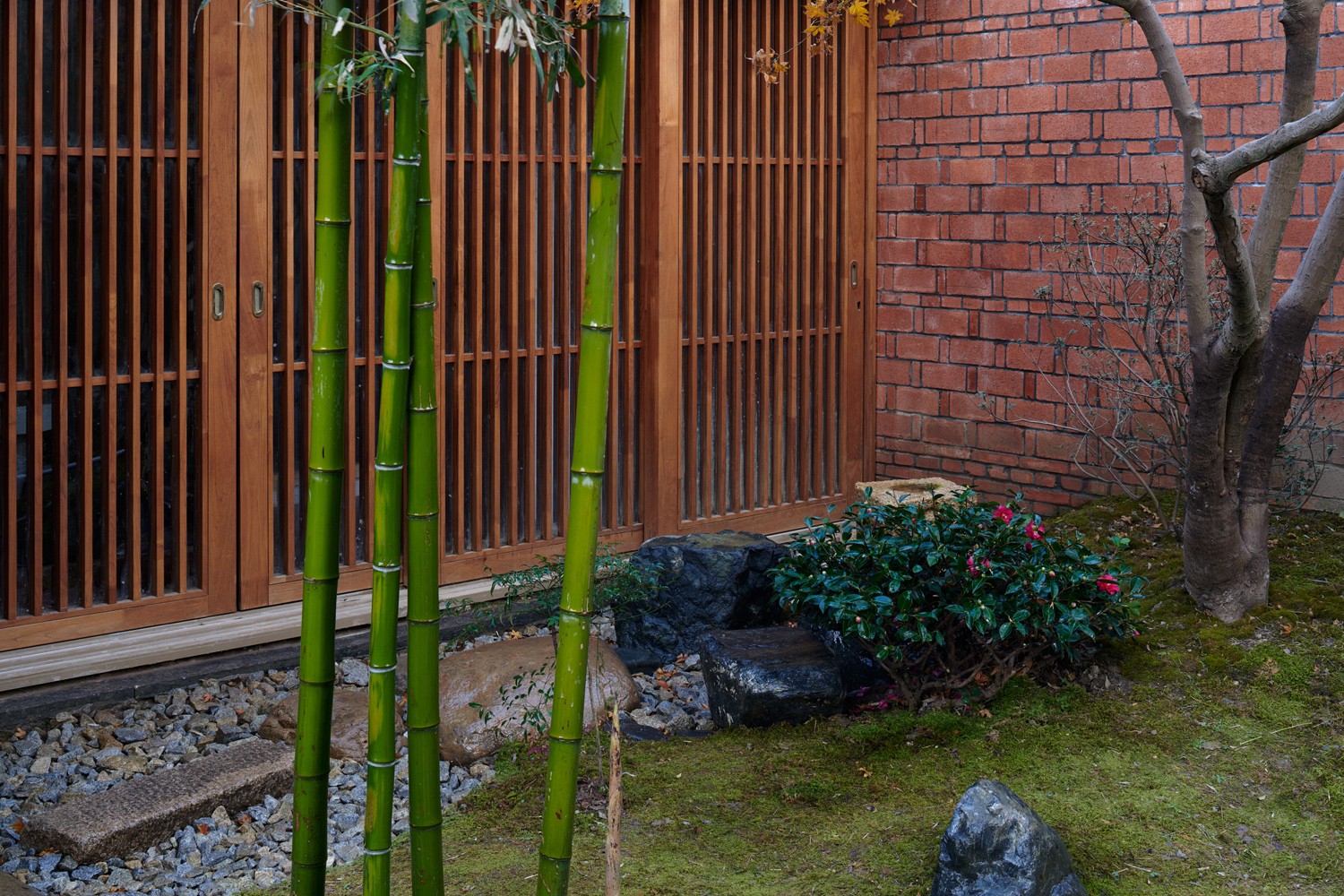
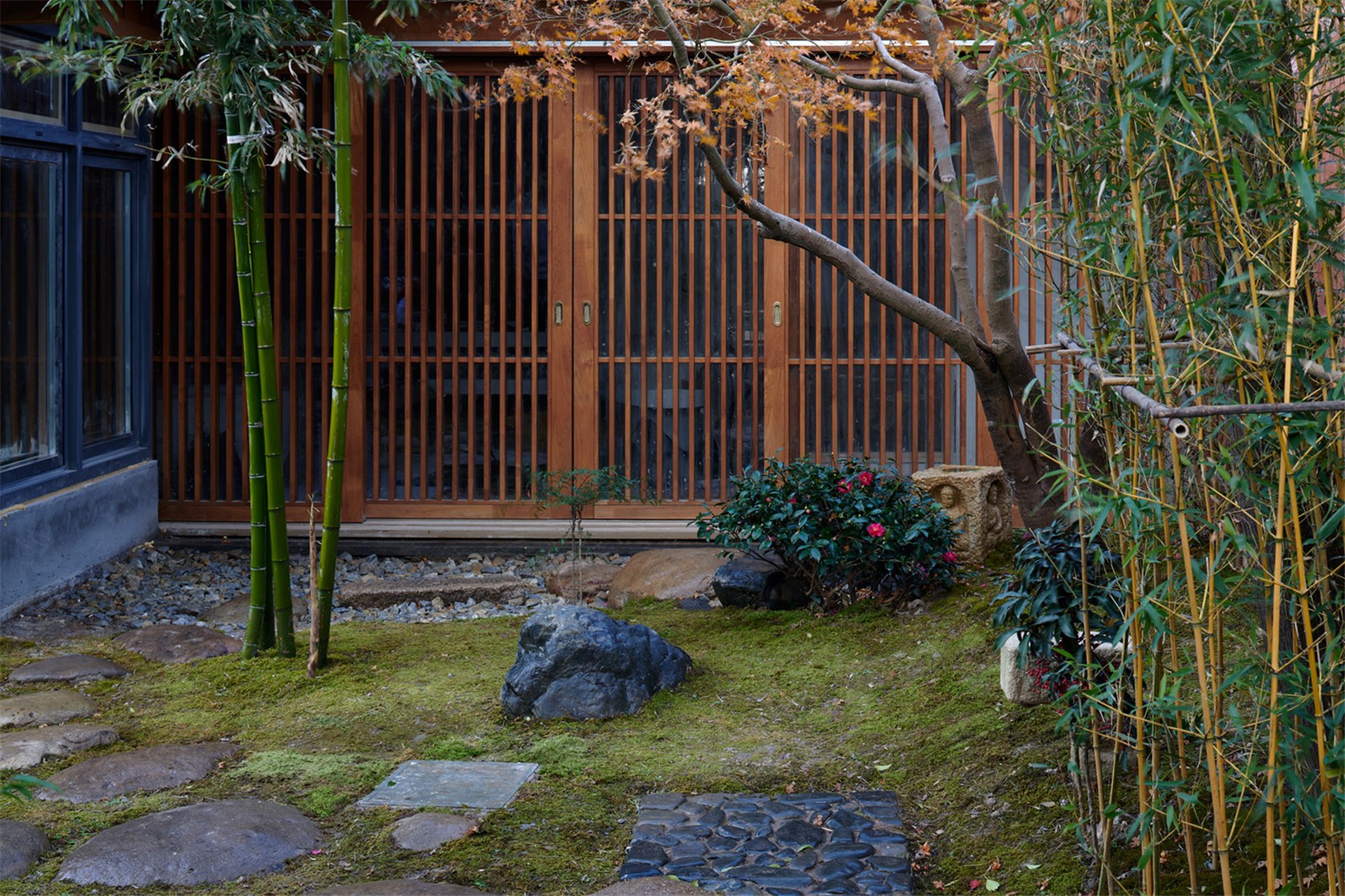
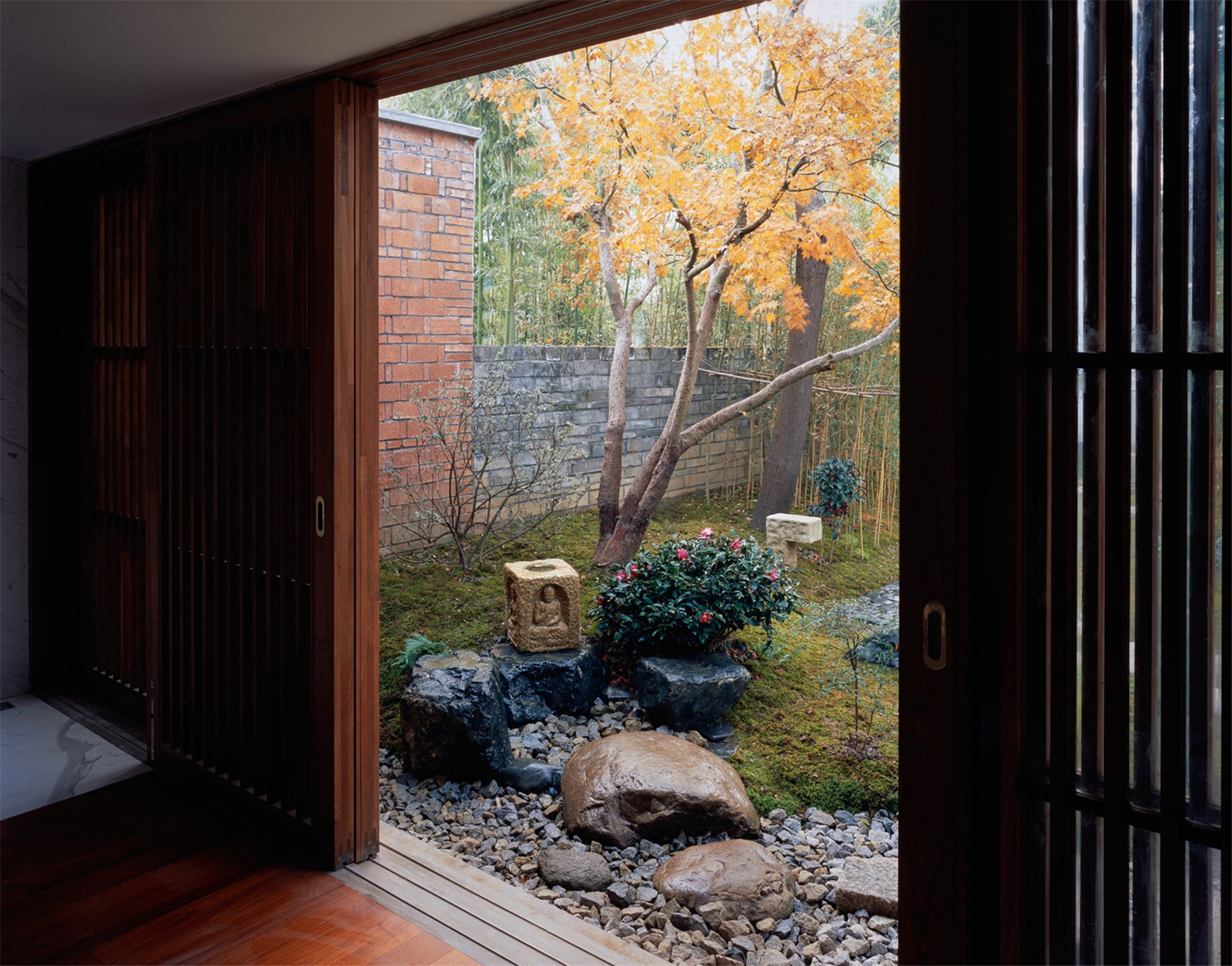
池島�����、石橋��、瀑布
Island, Stone Bridge, Waterfall
穿過連廊見中島,作為視線遮擋與隔斷���,同時(shí)形態(tài)上是自然小島���,此岸彼岸,為書齋空間更添儀式感��。經(jīng)石橋砂海與汀步����,遠(yuǎn)遠(yuǎn)便可聽見瀑布流水,節(jié)奏緩急有序�����。汀步�����、亂拼��、駁岸石�����、延段石都采用傳統(tǒng)方法,樸實(shí)自然����。適宜靜觀的庭園空間一直延續(xù)到西側(cè),延綿至入口的引導(dǎo)空間���,完成一層的完整游園路徑���。
Passing through the corridor, the island comes into view. The island serves both as a visual barrier and a natural landscape���,adding a sense of formality to the tour before entering the library area. Traversing over the stone bridge, sea of gravel, and stepping stones, users can easily hear the waterfall from afar, providing an orderly degree of urgency to the rhythm of the space. Stepping stones, irregular paving, riparian-edge stones, and connection stones take on the traditional form, simple and natural. The inner garden, best used for viewing, extends westward wrapping around the building towards the front entrance, completing the garden route of the first floor.
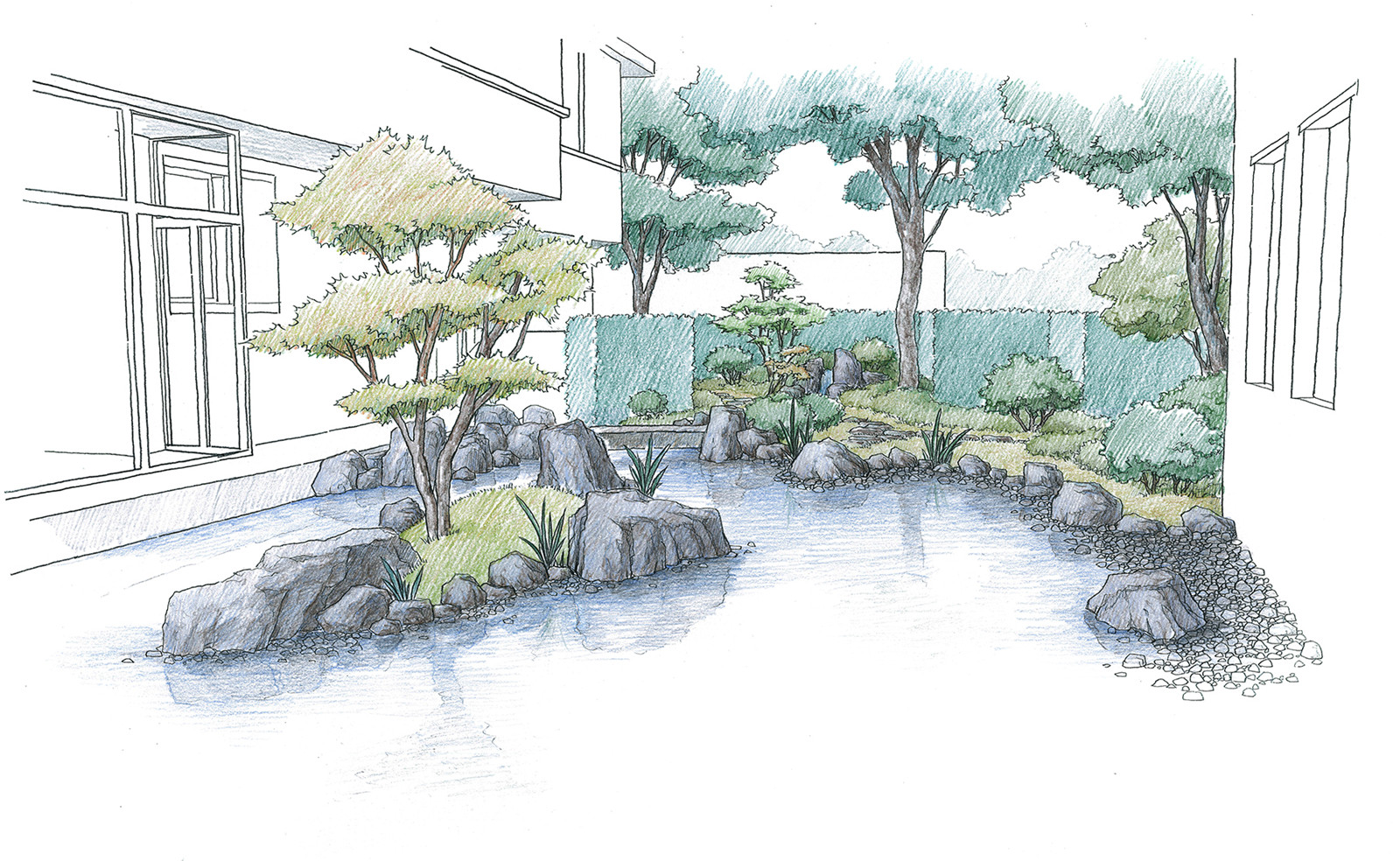
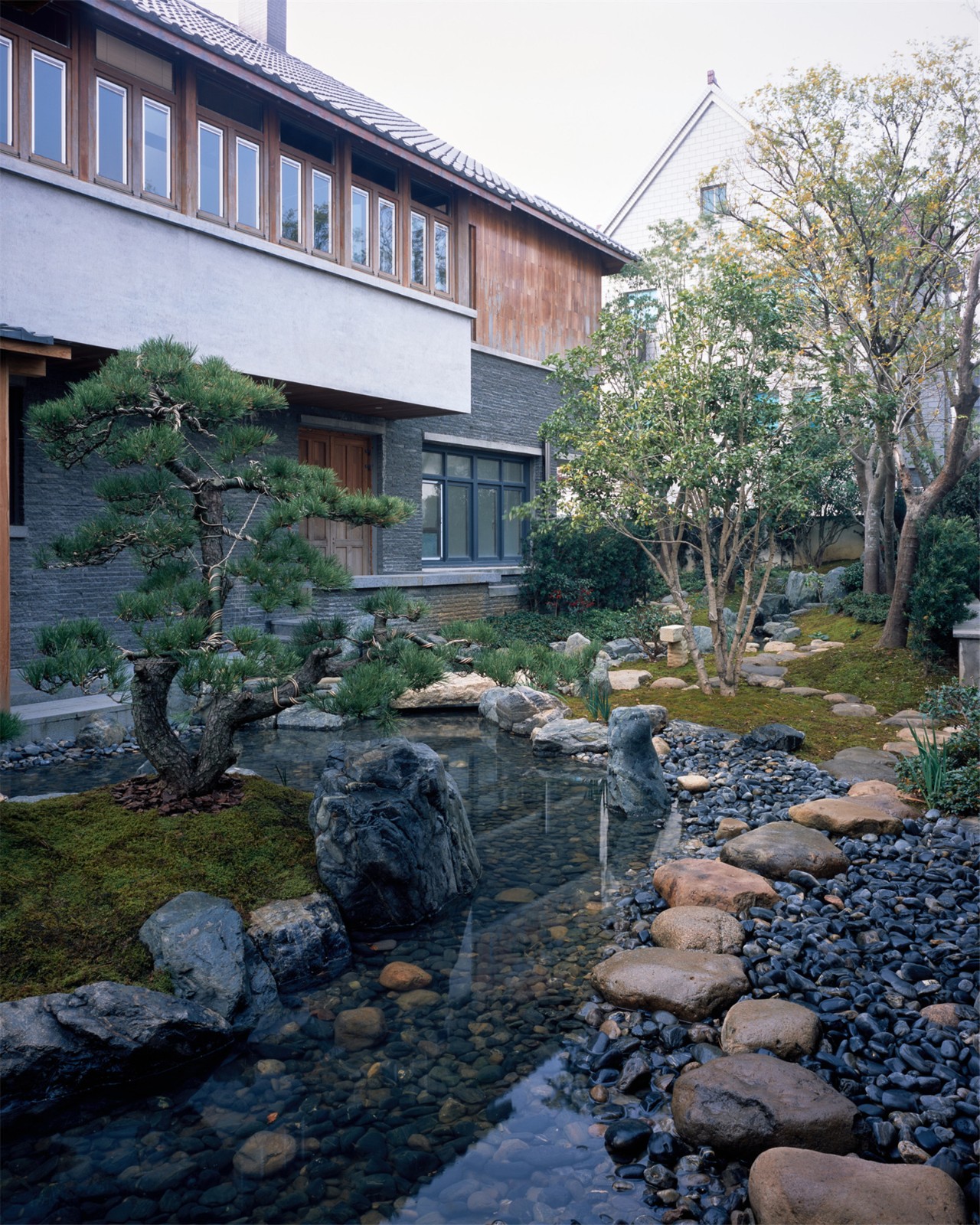
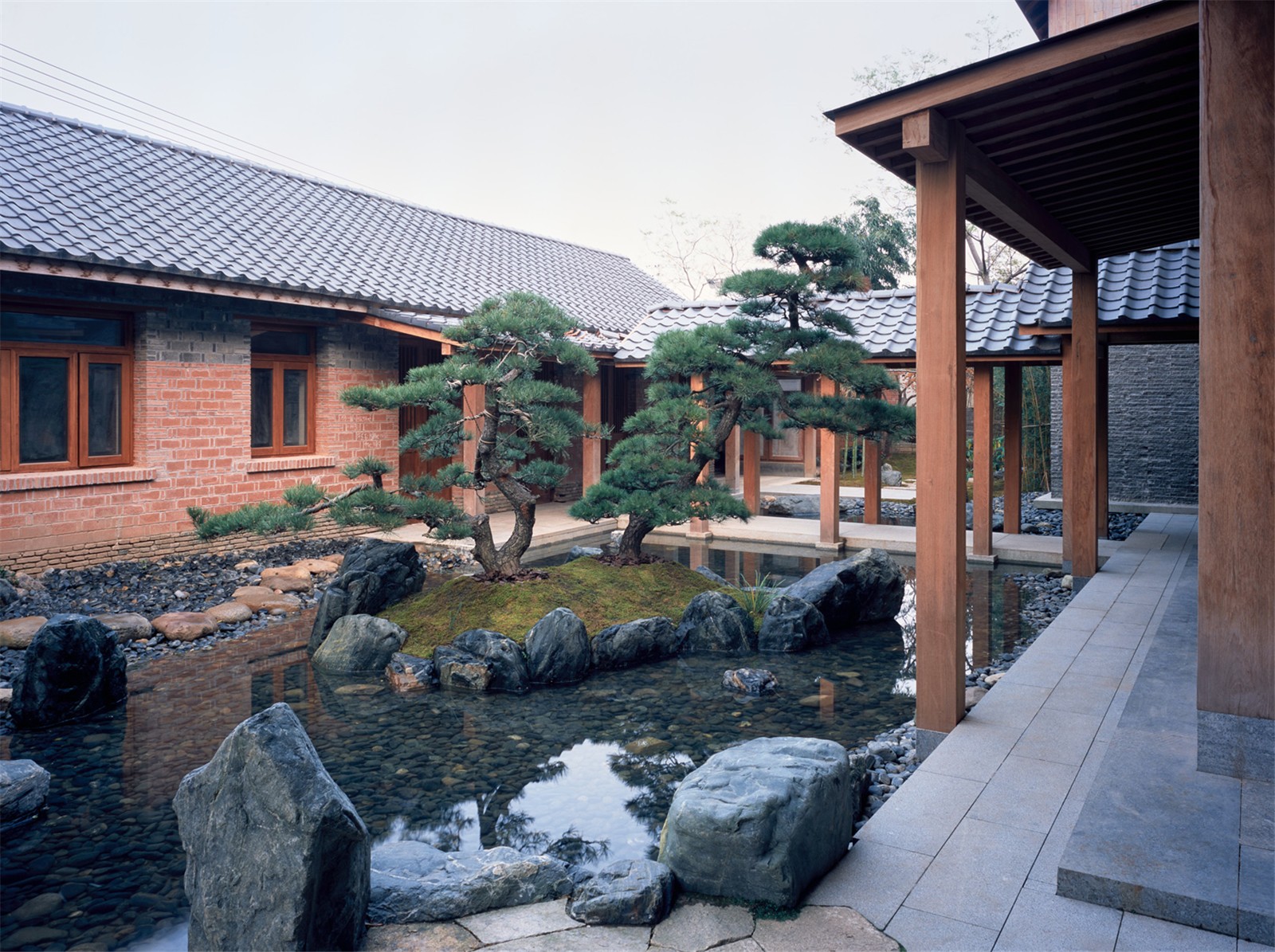
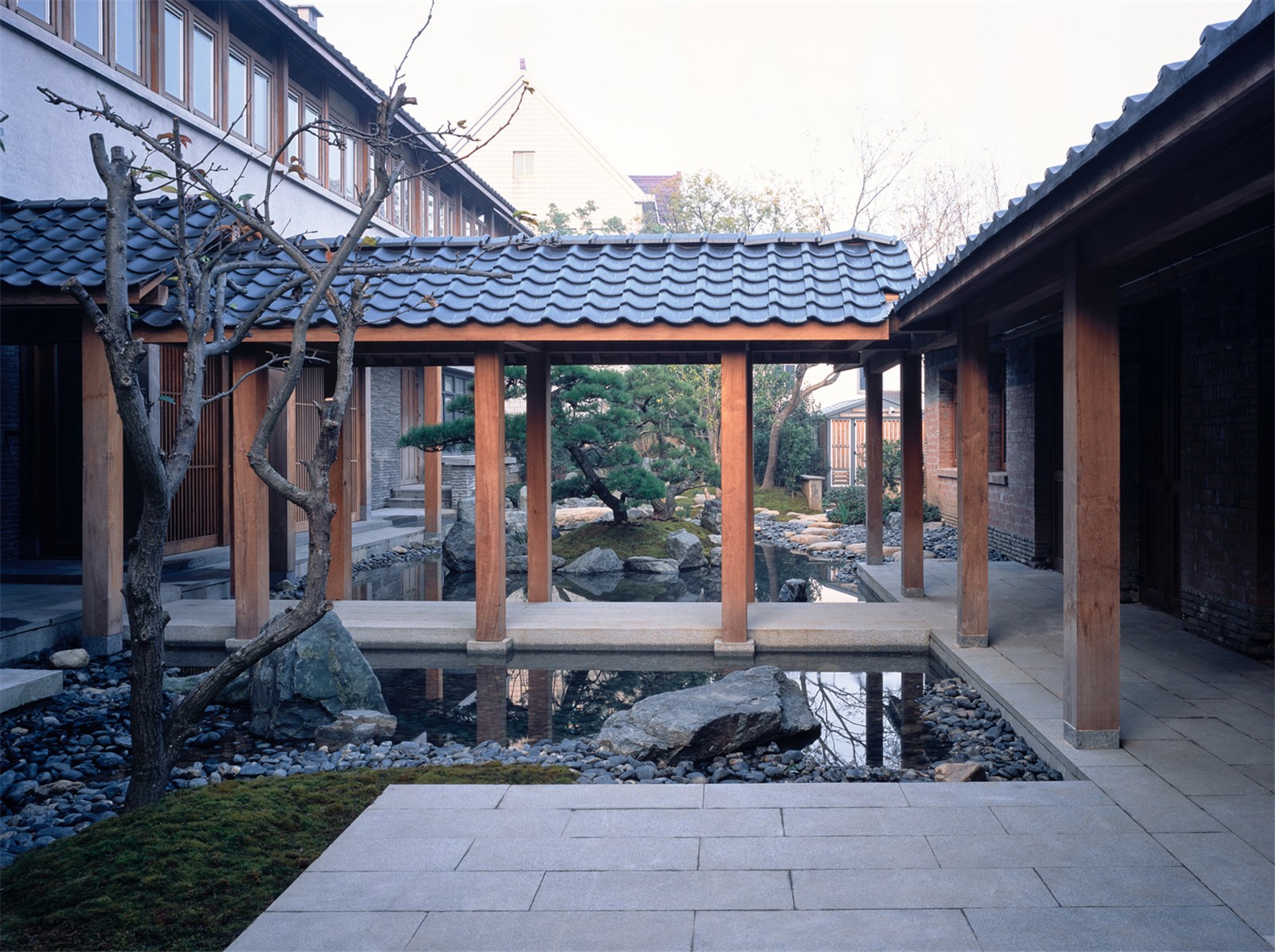
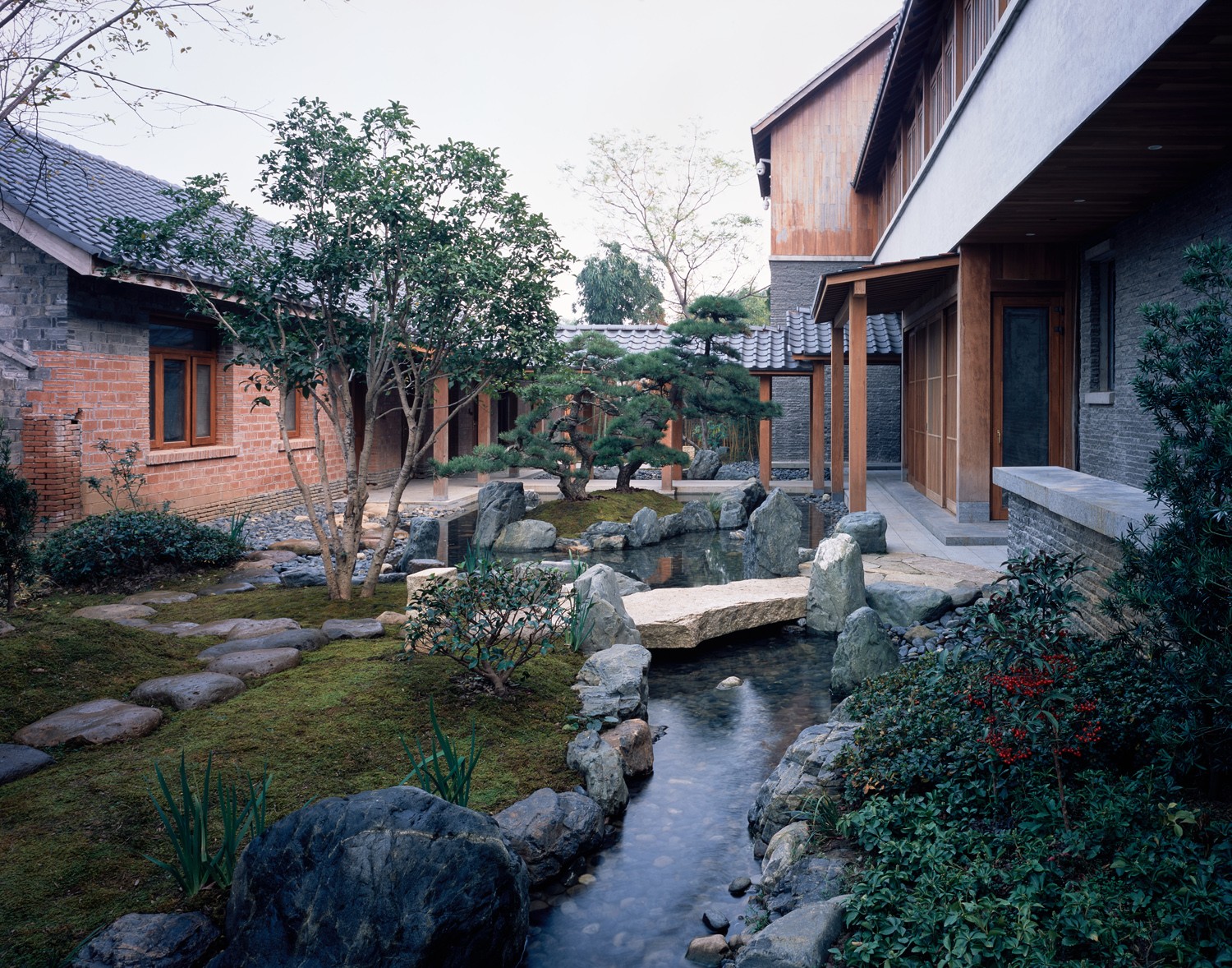
下沉中庭
Sunken Atrium
下沉庭園空間的現(xiàn)代風(fēng)格水景���,使從上到下有不同的空間風(fēng)格轉(zhuǎn)換。此處空間所對(duì)應(yīng)的是臥室向外觀景點(diǎn)�����,以水幕作為背景水簾���,飛流直下聲聲入耳�����。前景一處黃銹石原石做雕塑化處理的石構(gòu)件��,同時(shí)也是樹池����。用一棵樹連接自然,陽光斜灑����,葉片透出光亮,可從風(fēng)動(dòng)����、變色、落葉�,真切感受到四季變化。
Sunken atrium sports a modern style, differentiating itself from the traditional style of the other parts of the garden. A waterfall not only serves as the backdrop but also the source of thrilling acoustics in the atrium, which is located outside the lower level bedroom. The foreground is comprised of a statue-processed yellow-rust stone also serving as a planter. A single tree in the atrium allows users to experience seasonal change. Leaves moves in harmony with the environment, glimmering in the air reflecting light from the sun and oscillate in the wind.
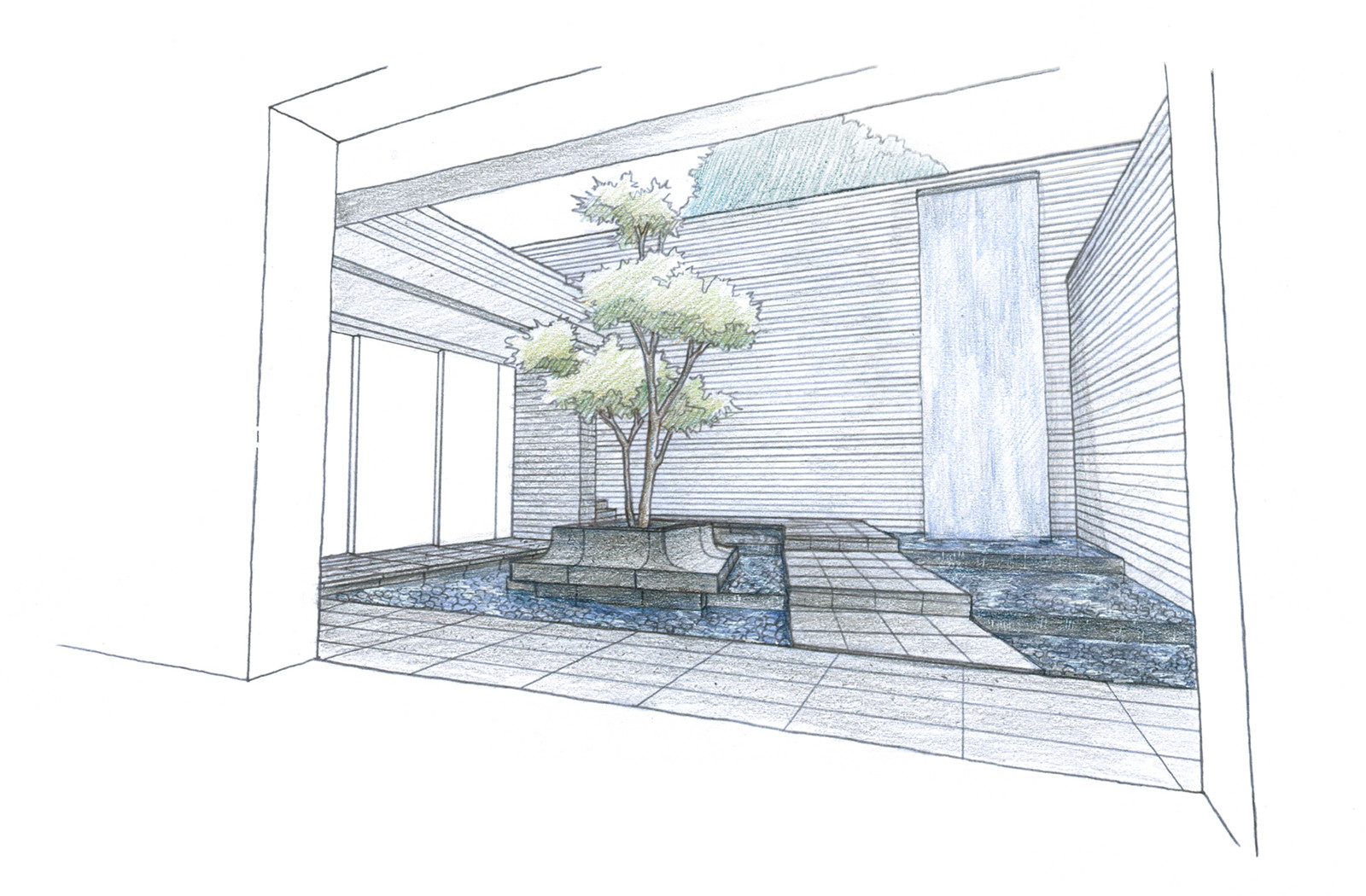
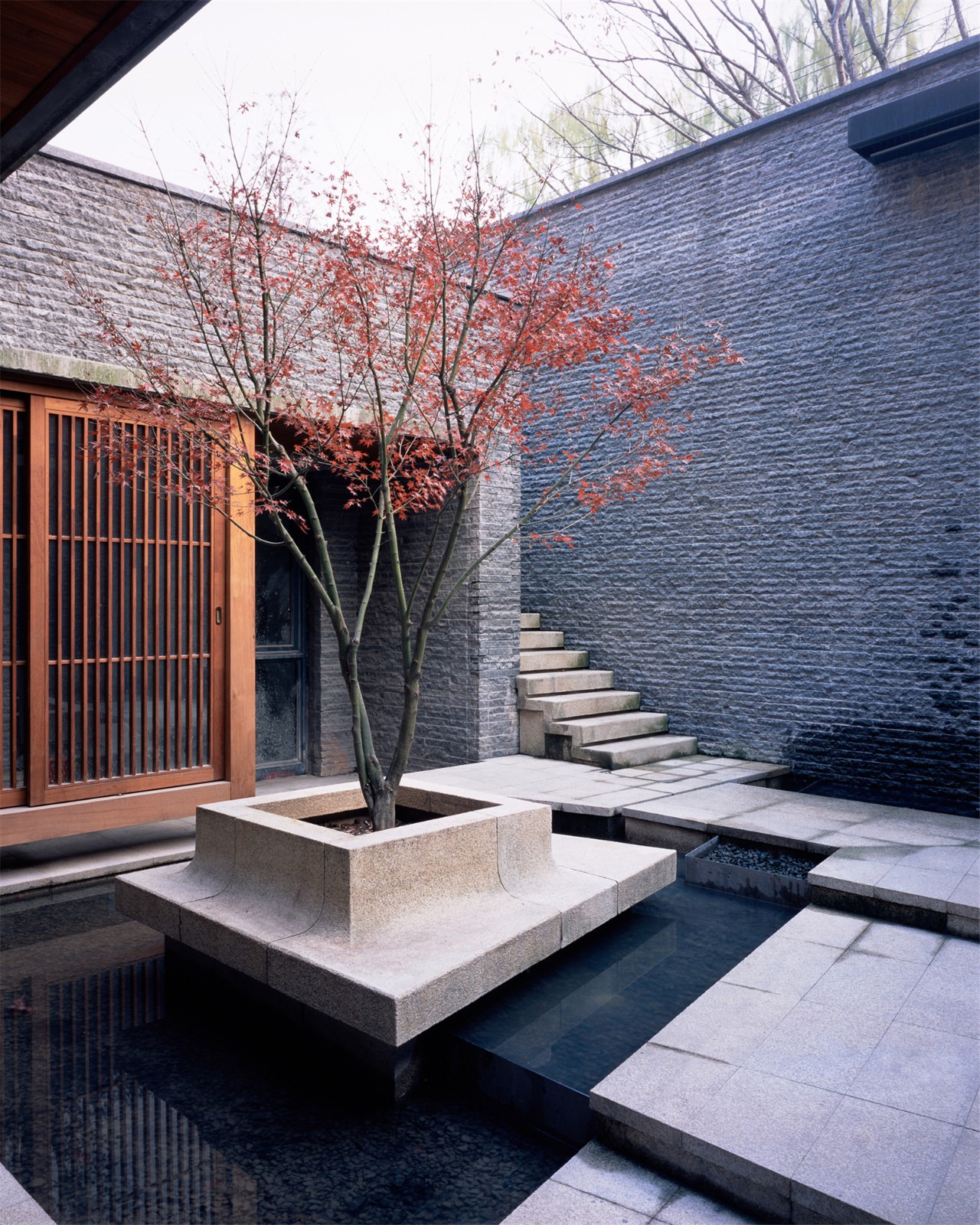
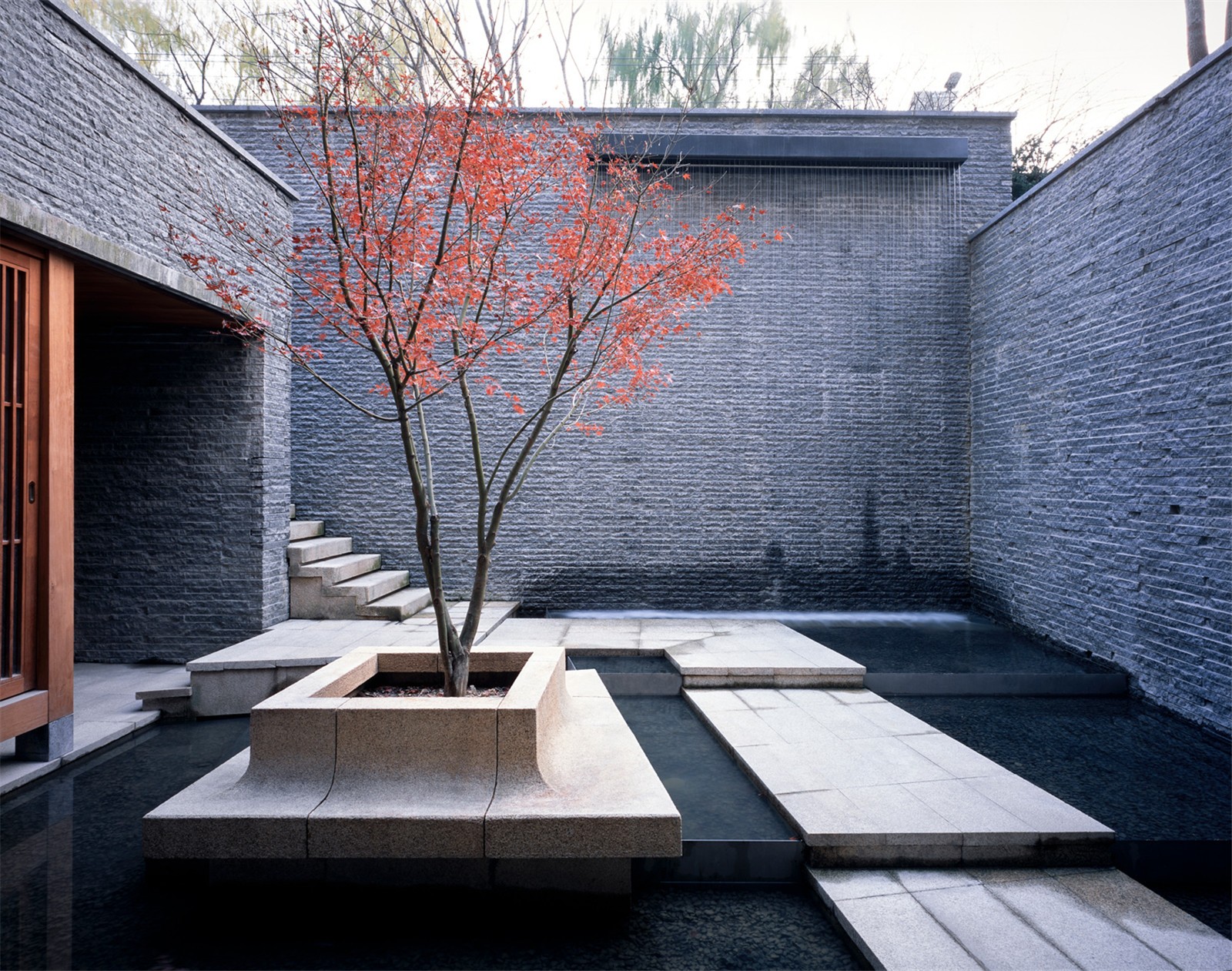
河堤駁岸
Riverside
游園并未結(jié)束����,在院墻之外,另有一處可休憩的場(chǎng)地���。項(xiàng)目南側(cè)墻外原有一座祈福的觀音廟����,設(shè)計(jì)師在墻外側(cè)回應(yīng)當(dāng)?shù)卮迕癯;氐皆返牧?xí)慣��,可在此進(jìn)行一些紀(jì)念習(xí)俗��。并在河岸邊設(shè)置石擋與景觀坐石��,為鄉(xiāng)里人歇坐���、嘮嗑提供了一處場(chǎng)所�。
The garden tour extends beyond the property wall as there is a renovated community space along the riverside for locals to sit and converse under the willows. Previously, a small temple used to be located adjacent to the property; to bring back the traditions of worshiping and praying, a section of the property wall is refurbished for this purpose. Stones are used for barricades and seating.
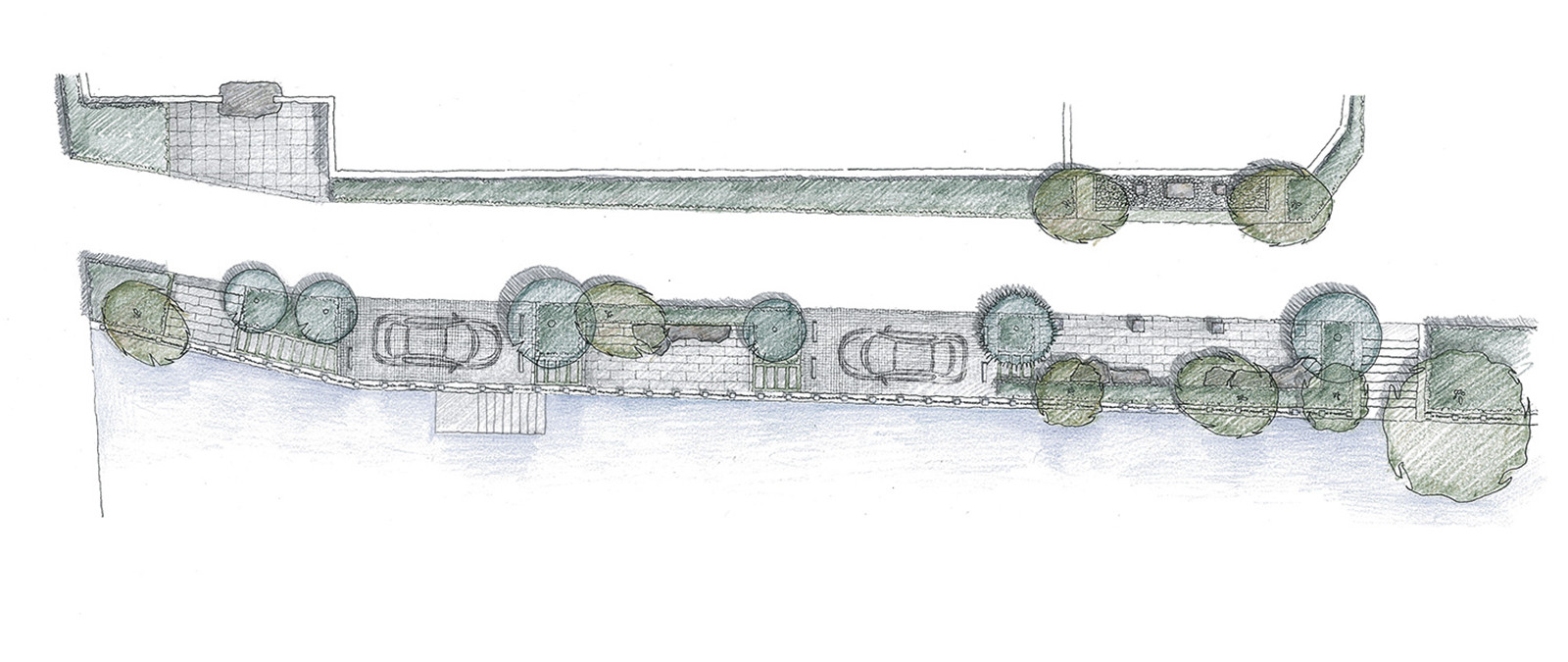
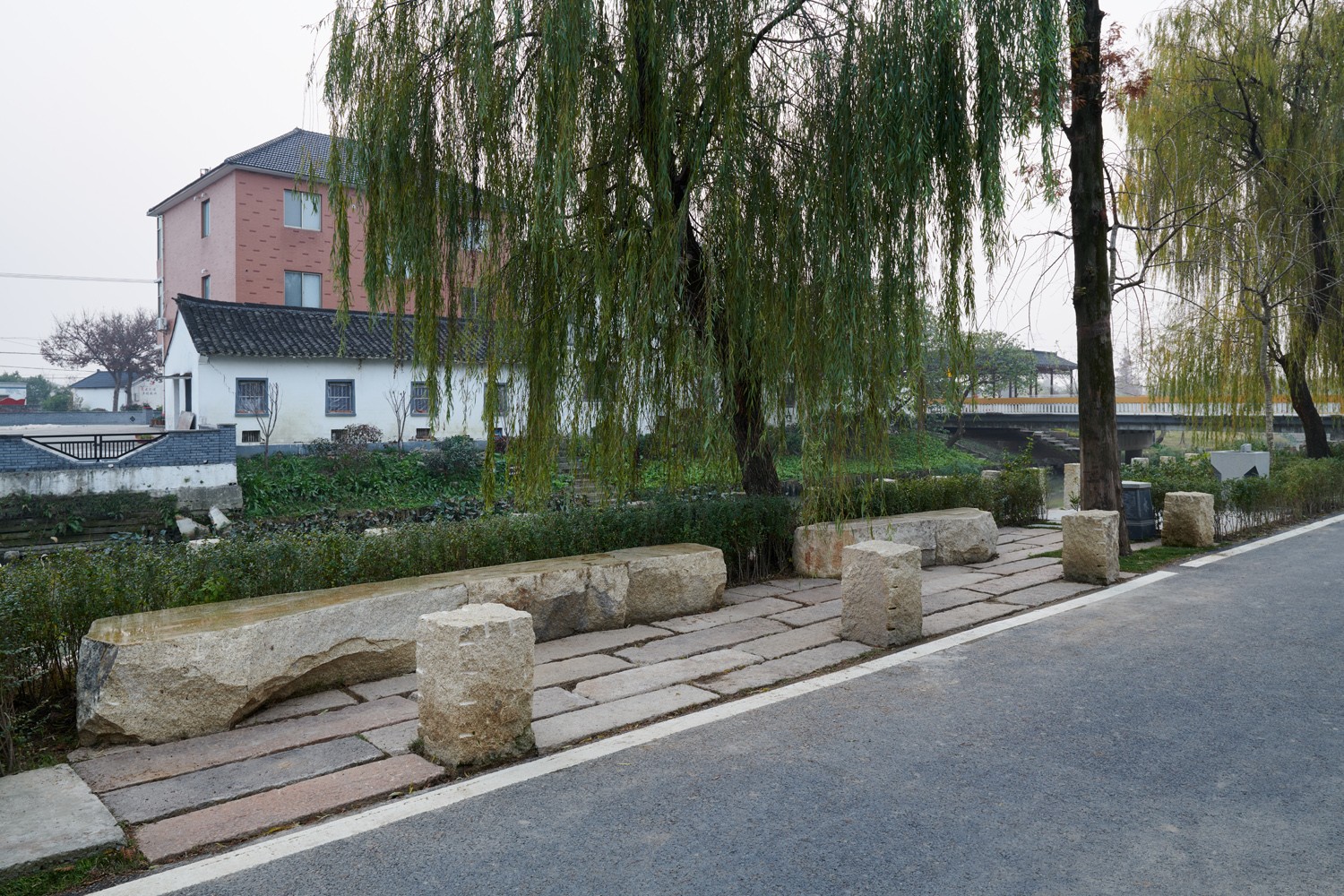
項(xiàng)目名稱:青蓮?fù)?/sup>
項(xiàng)目地點(diǎn):浙江海鹽青蓮村
設(shè)計(jì):七月合作社
公司網(wǎng)站:july-co.com
公司郵箱:info@july-co.com
設(shè)計(jì)團(tuán)隊(duì):康恒���、孫偉、蘇揚(yáng)����、葉釗
內(nèi)容:概念設(shè)計(jì)、深化圖紙?jiān)O(shè)計(jì)�、設(shè)計(jì)監(jiān)理
庭園面積:約1650平方米
施工時(shí)間:2017.02
竣工時(shí)間:2020.12
攝影:陳顥
視頻及錄音:孫偉、胡曉楠�、皮得寶
Project Name: Qinglian Garden
Project Location: Qinglian Village, Haiyan, Zhejiang Province
Landscape Design: July Cooperative Company
Lead Designers: Heng Kang, Wei Sun, Yang Su, Zhao Ye
Project Scope: Conceptual Design, Construction Drawings, Design Supervision
Project Size: Approx. 1650 square meters
Construction Date: 2017.02
Completion Date: 2020.12
Photography: Hao Chen
Media & Sound: Wei Sun, Xiaonan Hu, Petersberg
Website: july-co.com
Email: info@july-co.com
版權(quán)聲明:本文版權(quán)歸原作者所有,請(qǐng)勿以景觀中國編輯版本轉(zhuǎn)載��。如有侵犯您的權(quán)益請(qǐng)及時(shí)聯(lián)系,我們將第一時(shí)間刪除�。
投稿郵箱:contact@landscape.cn
 京公海網(wǎng)安備 110108000058號(hào)
京公海網(wǎng)安備 110108000058號(hào)























